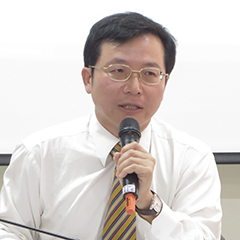- Member
- Research Summary
- Research output
In recent years, Taiwan's air pollution issues have been constantly fermented and warming, causing broad attention and public opinions from social and civic groups. However, the problem of air pollution is not only related to conflict between environmental protection and economic development, but also related to the health risks of our people, and even more, related to national governance under environmental justice risk distribution problem. It can be found that air pollution of human society, in fact, presents a typical risk of social characteristics, because "air and people" has close relationship, the most direct impact is physical life problem. Therefore, environmental pollution control subject of air pollution, in fact, dangerously tests of government's risk management model, if taking traditional thinking to deal with environment policies in the past, delivers a single type administrative organs of air pollution control policies, it may make government affected people conflict between distrust and protest. Therefore, the issues need to be coordinated across different government departments and cross-domain governance in order to solve environmental problems under air pollution, health hazards and environmental education and other issues.
In air pollution control, in 1975, we developed air pollution control law, began our air quality maintenance starting point. However, with economic development, high-polluting industries also continue to grow under the context of regulatory standards are not advancing with times, there is no significant transformation of industrial physique, in such structural institutional issues, and one of the characteristics of air pollution is affected by climate, topography, photochemical reaction and so on, but with derivative, diffusion, cumulative asymmetric distribution characteristics. Its special nature of administrative control is difficult to control behavior. Even under current scientific knowledge and monitoring of air pollution, there are still problems with regulatory dilemmas. According to current situation of science, technology and knowledge, our control policies and system design makes control of air pollution control issues more dangerous, Taiwan's risk management hysteresis and information hiding, also becomes more obvious.
In this regard, this project considers that air pollution control issues are serious and need further in-depth exploration. To follow risk society, regulatory science theories and other macro-perspective and ways, and by literature review method to study advanced countries and organizations how to deal with air pollution control; also by experts, focus groups and other research methods for more in-depth and clarify status of our air pollution control policies, standardize the standards and the dilemma of problems. Such as how to solve Taiwan central and southern industries, manufacturing counties and cities air pollution emissions affect industrial and manufacturing industries and counties pollution? At present, the allocation of air control areas in Taiwan can effectively carry out pollution control responsibility? The implementation of total air pollution control in Taiwan, the dilemma of control policies and the lack of legal system? How does government effectively carry out risk communication on air pollution?
With the discussion of above sub-topics, to point out that under the framework of environmental risk policies, the concept and mode of cross-border risk management should be more needed in our government system; with this plan, we can promote our current Hazardous Air Pollutant, HAPs control law; more importantly, this plan attempts to put forward government to face emerging risk management challenges, should be different from traditional cross-border risk management model, create mechanisms and platforms to allow public to conduct public scrutiny. This study is expected to be able to disseminate risk knowledge of air pollution prevention and control through large-scale academic seminars, workshops, publications, etc., and to provide innovation and reform for the model and system of science and technology governance as reference.
| 媒體投書與專題報導 | |
| 媒體名稱 & (作者) | 篇名 |
| 蘋果日報 | 王瑞庚、趙家緯:呼吸健康空氣的距離還有多遠 |
| 自由時報 | 許厝學童回校 台大︰孩子非實驗品 |
| 蘋果日報 | 【轉載】解讀台化訴願案 肯定環保署訴願會 |
| 轉載 | 【新聞轉載】五輕遷廠說石化特別報導 |
| 研究報告 | |
| 報告類型 | 篇名 |
| working paper | 《THE WORKING PAPER OF RSPRC 2016》久聞不知其毒:台灣空污治理的挑戰-杜文苓 |
| working paper | 《THE WORKING PAPER OF RSPRC 2017》臺灣空氣污染之風險治理與制度研究 |
| working paper | 《THE WORKING PAPER OF RSPRC 2018》臺灣空氣品質治理展望 |
| 其他產出 | |
| 類型 | 標題 / 活動名稱 |
| 電子報 | 治理改革才有好空氣:美國經驗兩點參考 |
| 電子報 | 空污政策12年一步?我們還有多少個12年? |
| 電子報 | PM2.5跨域污染之改善研議:以臺灣南投為例 |
| 電子報 | 空氣污染跨域問題與改善方案研議:美國經驗介紹 |
| 電子報 | 臺灣空氣污染微型監測之現行建置盤點(一) |
| 電子報 | 臺灣空氣污染微型監測之現行建置盤點(二):比較官方測站與微型監測 |
| 電子報 | 臺灣空氣污染微型監測之現行建置盤點(三):微型監測的象徵意義與未來發展 |
| 電子報 | 從VOCs管制看空污治理的新趨勢與新想像 |
| 電子報 | 環境影響評估應以人為本—陳椒華教授談環評法對人民健康風險的漠視 |
| 電子報 | 細懸浮微粒歷史變化與健康風險之關係 |
| 電子報 | 臺灣應針對細懸浮微粒(PM2.5)進行跨域治理 |
| 電子報 | 細懸浮微粒(PM2.5):風險治理新挑戰 |
| 電子報 | 政府應重視VOCs的嚴重危害性而要將其與PM 2.5一併處理 |
| 電子報 | 我不認識我呼吸的PM2.5 |
| 活動紀實 | 【活動回顧】生祥樂隊「圍庄」台大巡迴X空污環境講座:從看見、聽見到行動:空污的公民反擊 |
| 活動紀實 | 【活動回顧】臺灣風險社會論壇-空氣污染與能源轉型(三) |
| 活動紀實 | 富邦全球化講堂:我呼吸 我決定 |



